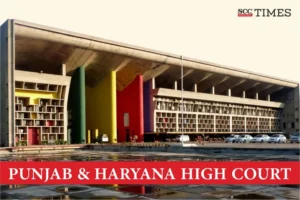Punjab and Haryana High Court: In a bail application filed under Section 483 of Bharatiya Nagarik Suraksha Sanhita, 2023, by a foreign national in a cyber fraud case worth Rs 2.81 Crores, a Single Judge Bench of Anoop Chitkara, J., allowed the petition, holding that the accused was a first-time offender and did not require further pre-trial incarceration.
Background
The complainant alleged that he received WhatsApp messages from two mobile numbers which induced him to invest in the stock market. The complainant invested Rs. 2.81 Crores but after some time when he tried to withdraw the amount from the said app, his request was declined, and he lost a huge amount of money. Aggrieved, the complainant lodged an FIR under Sections 318(4) BNS and 61(2) of the Bharatiya Nyaya Sanhita, 2023, and Section 66-D of the Information Technology Act, 2000.
Analysis
The Court noted that according to the bail application, the accused had been in custody since 18-12-2024. The Court stated that there was sufficient prima facie evidence connecting the accused with the alleged fraud. However, considering that he was a first-time offender and his pre-trial custody as per his role, it was not a case for further pre-trial incarceration.
Thus, the Court held that the accused was entitled to bail and allowed the application granting him conditional bail.
Thereafter, the Court stated that though bail had been granted, the underlying issue remained unresolved, leaving the broader demands of justice unfulfilled. The Court remarked that generally, every foreign national entering India, does so for a defined purpose and a finite duration. While some may engage in unlawful activities, such as cyber frauds and illicit trafficking of controlled substances, a measured legal response necessitates vigilance at the point of entry rather than the indiscriminate denial of bail. The cornerstone of an effective deterrence mechanism lies in rigorous pre-admission scrutiny and comprehensive background verifications before visa issuance and the immediate revocation of visas upon credible and substantial allegations.
The Court further stated, “when a foreign national faces criminal prosecution within Indian jurisdiction, legal proceedings may tether them to the country, disrupting their academic aspirations, familial responsibilities, commercial enterprises, and personal liberties. Justice delayed is justice denied, but in the context of foreign nationals, justice prolonged is justice misplaced.”
The Court added that delayed trials and resultant legal limbo engender uncertainty in these individuals, compounding their fears within an unfamiliar jurisdiction and an unaccustomed to legal system. Recognising the far-reaching repercussions of protracted litigation, the Court stated that it was incumbent upon the judiciary to ensure the expeditious resolution of such cases, whether the accused is in custody or released on bail.
Accordingly, the Court requested the Trial Court to prioritize and accelerate adjudication in the present matter, balancing the necessities of due process with the principles of swift and faultless justice.
[Muhammad Jamil v. State of Haryana, 2025 SCC OnLine P&H 1538, decided on 21-03-2025]
Advocates who appeared in this case :
For the petitioner: Abbas. B, Bhumika Khatri, and Sunil Kumar Dhanda
For the respondent: Deputy Advocate General Aashish Bishnoi and Budhadev Maity

